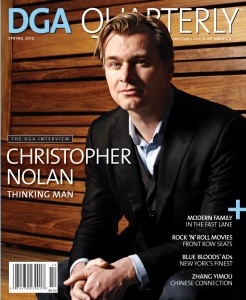

By Ray Pride Pride@moviecitynews.com
Chris Nolan Goes Photochemical In DGA Quarterly Interview
 Alongside Gendy Alimurung‘s LA WEEKLY cover story, “Movie Studios Are Forcing Hollywood to Abandon 35mm Film. But the Consequences of Going Digital Are Vast, and Troubling,” the DGA Quarterly cover-stories an extensive interview with Christopher Nolan on matters digital and photochemical. “For the last 10 years, I’ve felt increasing pressure to stop shooting film and start shooting video, but I’ve never understood why. It’s cheaper to work on film, it’s far better looking, it’s the technology that’s been known and understood for a hundred years, and it’s extremely reliable. I think, truthfully, it boils down to the economic interest of manufacturers and [a production] industry that makes more money through change rather than through maintaining the status quo. We save a lot of money shooting on film and projecting film and not doing digital intermediates. In fact, I’ve never done a digital intermediate. Photochemically, you can time film with a good timer in three or four passes, which takes about twelve to fourteen hours as opposed to seven or eight weeks in a DI suite. That’s the way everyone was doing it ten years ago, and I’ve just carried on making films in the way that works best and waiting until there’s a good reason to change. But I haven’t seen that reason yet. I’ve kept my mouth shut about this for a long time and it’s fine that everyone has a choice, but for me the choice is in real danger of disappearing. So right before Christmas I brought some filmmakers together and showed them the prologue for The Dark Knight Rises that we shot on IMAX film, then cut from the original negative and printed. I wanted to give them a chance to see the potential, because I think IMAX is the best film format that was ever invented. It’s the gold standard and what any other technology has to match up to, but none have, in my opinion. The message I wanted to put out there was that no one is taking anyone’s digital cameras away. But if we want film to continue as an option, and someone is working on a big studio movie with the resources and the power to insist [on] film, they should say so. I felt as if I didn’t say anything, and then we started to lose that option, it would be a shame. When I look at a digitally acquired and projected image, it looks inferior against an original negative anamorphic print or an IMAX one.” [Much more at the link.]
Alongside Gendy Alimurung‘s LA WEEKLY cover story, “Movie Studios Are Forcing Hollywood to Abandon 35mm Film. But the Consequences of Going Digital Are Vast, and Troubling,” the DGA Quarterly cover-stories an extensive interview with Christopher Nolan on matters digital and photochemical. “For the last 10 years, I’ve felt increasing pressure to stop shooting film and start shooting video, but I’ve never understood why. It’s cheaper to work on film, it’s far better looking, it’s the technology that’s been known and understood for a hundred years, and it’s extremely reliable. I think, truthfully, it boils down to the economic interest of manufacturers and [a production] industry that makes more money through change rather than through maintaining the status quo. We save a lot of money shooting on film and projecting film and not doing digital intermediates. In fact, I’ve never done a digital intermediate. Photochemically, you can time film with a good timer in three or four passes, which takes about twelve to fourteen hours as opposed to seven or eight weeks in a DI suite. That’s the way everyone was doing it ten years ago, and I’ve just carried on making films in the way that works best and waiting until there’s a good reason to change. But I haven’t seen that reason yet. I’ve kept my mouth shut about this for a long time and it’s fine that everyone has a choice, but for me the choice is in real danger of disappearing. So right before Christmas I brought some filmmakers together and showed them the prologue for The Dark Knight Rises that we shot on IMAX film, then cut from the original negative and printed. I wanted to give them a chance to see the potential, because I think IMAX is the best film format that was ever invented. It’s the gold standard and what any other technology has to match up to, but none have, in my opinion. The message I wanted to put out there was that no one is taking anyone’s digital cameras away. But if we want film to continue as an option, and someone is working on a big studio movie with the resources and the power to insist [on] film, they should say so. I felt as if I didn’t say anything, and then we started to lose that option, it would be a shame. When I look at a digitally acquired and projected image, it looks inferior against an original negative anamorphic print or an IMAX one.” [Much more at the link.]














